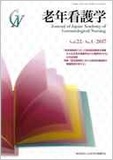Japanese
English
- 販売していません
- Abstract 文献概要
- 参考文献 Reference
抄録
65歳以上の入院患者に対し,純音聴力検査と半構造化面接を行った.正常聴力者(30dB未満)7人と高齢難聴患者(40〜69dB)8人の2群にKJ法を用い構造化・図解化を行い,正常聴力者と対比し高齢難聴患者が看護師に期待するコミュニケーションの特性について考察した.
正常聴力者は,【看護師中心という“非日常性”に困る】と感じ,【寄り添う配慮に感謝する】が,高齢難聴患者は,【動けないときに困る】が【仕方がないと諦める】場合と,【補わなくてもすごせる】【無自覚で押し通す】場合がある.いずれも,聴力障害による意思疎通の不全は【しわ寄せが自分に降りかかる】ことを意識し,多彩なストラテジーを採用し【補う工夫をする】が,聴力に応じた【こちら目線のきめ細やかな対応を望む】こと,【途中で確認できる会話がよい】ことを期待している.意思疎通不全の累積を生じさせないように意識的な対応をすることが看護師には求められていると考えられる.
A pure tone audiometry was conducted for inpatients above the age of 65, followed by semi-structured interview tests. The sample was categorized into two groups: seven with normal hearing and 8 with hearing loss. Using KJ method, the authors deepened interpretation of the hidden meaning of the interview findings. Discussion was focused on the nurse-patient communication expected from the elderly with hearing loss by comparison with that of the normal hearing group.
The normal hearing group strongly felt that they were separated from their daily lives and experiencing “difficulty adjusting to ‘non-everyday’ living due to hospitalization, in which a nurse played a central role.” They expressed their “deep gratitude for the compassionate support of nurses.”
The hearing loss group experienced “difficulties due to limited body movement”, which they accepted with “resignation accompanied by a sense of helplessness.” The situations included “experiencing confusion with the frequent nurse rotations”, “managing to get along without assistance” or “pretending to be unconcerned about the inconveniences.”
Patients well recognized that they were obliged to “bear the burden of undesirable consequences” and, therefore, the accumulated communication failures due to hearing difficulties lead to their unconscious adoption of strategies such as “contriving to overcome difficulties” or “staying concerned with what is important.”
In order not to be physically and mentally exhausted, the patients expected “sensitive care from the patients' perspectives” as well as “frequent confirmations of nurse-patient conversations” with deep concern for the hearing-disabled elderly people. Elderly with hearing loss expect “communication which can be interrupted midway through conversation” by their own initiative.
Copyright © 2017, Japan Academy of Gerontological Nursing All rights reserved.


